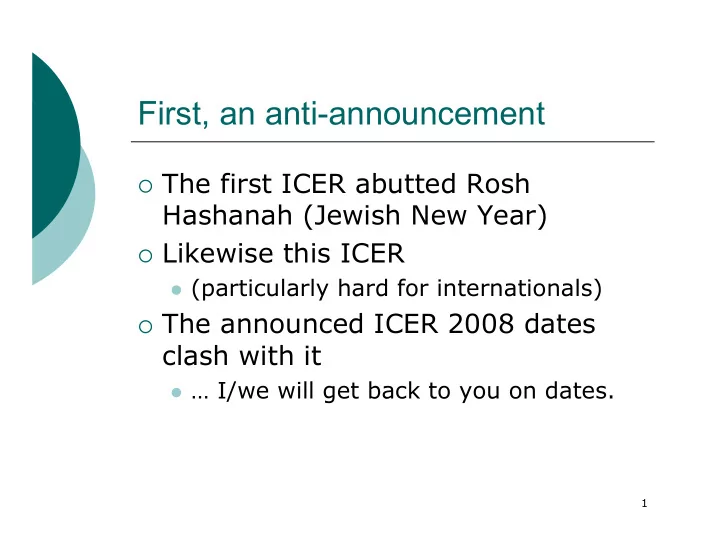

First, an anti-announcement The first ICER abutted Rosh Hashanah (Jewish New Year) Likewise this ICER (particularly hard for internationals) The announced ICER 2008 dates clash with it … I/we will get back to you on dates. 1
What are the barriers to learning computing? ICER Discussion Raymond Lister University of Technology, Sydney, Australia 2
What barriers, or conjectures about barriers, do we see in the ICER 2007 papers? 3
Maybe tell my anthropologist story Here or later? 4
“Through the Eyes of Instructors: A Phenomenographic Investigation of Student Success”, Kinnunen, McCartney, Murphy, and Thomas { Nature of the subject Intrinsic – the “geek gene” { Previous Experience Do I believe this? Attitude / Behaviour Ask me again in 10 years Developmental 5
Stasko Keynote (Developmental) Visualizations & other representations An aid, or more to learn? Barrier (or inclined plane): We under estimate how long it takes students to move from concrete to abstract E.g. Classic chess studies of Chase and Simon E.g. Computer Science: Adelson (1984) 1, 3 and 7 6
Developmental again? (or subject?) 7
Schulte and Knobelsdorf, “Attitudes Toward Computer Science …” “… learning problems are not always due to difficulties of understanding, but due to a kind of unwillingness to change the current conceptualization, caused by a lack of meaningfulness of the new concept for the learner…” Previous Experience? Attitude / Behaviour? Compare with Yarosh and Guzdial, “Narrating Data Structures”. Contrast with the next paper … 8
Yardi & Bruckman, “What is Computing? Bridging the gap between Teenagers’ Perceptions and Graduate Students’ Experiences” Teenager’s have perceptions Previous Experience? … superficial? Attitude / Behaviour? … wrong? Grad students have experiences … and therefore the legitimate view? … or are they demented? Programming – ability or disability? If we are constructivists, then we need to value student prior experiences, at least enough to help them build upon those prior experiences. (Which I think Yardi and Bruckman advocate.) 9
Commonsense Computing (episode 3): Concurrency and Concert Tickets Lewandowski, Bouvier, McCartney, Sanders & Simon Respects the prior experience Previous Experience? At least enough to build upon it Replication! Not enough of it! “We found that the categorizations developed by Ben- David Kolikant were also meaningful when applied to our data, and that our beginning CS1 students are more likely to give centralized solutions (as opposed to decentralized ones) than Ben-David Kolikant’s concurrency students” “… 33% of the solutions in the Ben-David Kolikant study were centralized. Our study shows an even higher number of centralized solutions (55%)” Statistical significance? Is it even appropriate to compare these two groups of students? 10
Hanks and Simon, “First Year Students Impressions of Pair Programming” Attitude / Behaviour? Developmental? “I got stuck. I sat there for hours trying to figure out what was happening, and then somebody noticed some small error that I had, and I fixed it, and everything worked. And I just sort of sat there and cried for a little bit .” - “ Low hanging (qualitative) fruit ” - Qualitative research into pair programming now needs to connect to theory. 11
(Developmental) Eckerdal et al., “From Limen to Lumen” A welcome connection to a “theory” If threshold concepts is a theory How does threshold concepts relate to cognitive theory? “… the student is being transformed … acquiring a new identity, that of an insider … This project fits squarely within the constructivist tradition ” (!?) Back sliding objectivists? Or a welcome attempt at transcending ye olde constructivist vs. objectivist dialectic? 12
General observation Analysis is … 13
“Through the Eyes of Instructors: A Phenomenographic Investigation of Student Success”, Kinnunen, McCartney, Murphy, and Thomas Nature of the subject No papers from that perspective Intrinsic – the “geek gene” Previous Experience Attitude / Behaviour Developmental 14
In summary More qualitative than quantitative. Not a lot of theory Getting better (with experience) at method 15
16
“the ritual inclusion of code or program structures that serve no real purpose” 17
18
19
Preliminaries Sally & Josh, “Warren’s Question” It’s not safe to say those things in your own institution The Disciplinary Commons is a safe place ICER is not a commons It’s a research conference, but … Can we find a way of critically engaging that doesn’t involve some of the traditional research bullshit? 20
Recommend
More recommend